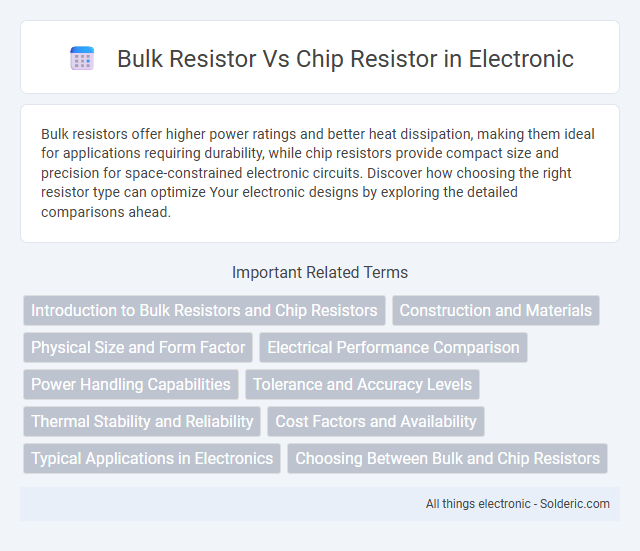Bulk resistors offer higher power ratings and better heat dissipation, making them ideal for applications requiring durability, while chip resistors provide compact size and precision for space-constrained electronic circuits. Discover how choosing the right resistor type can optimize Your electronic designs by exploring the detailed comparisons ahead.
Comparison Table
| Feature | Bulk Resistor | Chip Resistor |
|---|---|---|
| Size | Large, bulky | Compact, surface-mount |
| Mounting Type | Leaded through-hole | Surface Mounted Device (SMD) |
| Power Rating | Typically higher (up to several watts) | Lower power (usually <1 watt) |
| Tolerance | Commonly 5% to 10% | High precision options down to 0.1% |
| Applications | Power circuits, high power dissipation | Compact electronics, precision circuits |
| Cost | Generally lower cost per unit | Higher cost due to size and precision |
| Heat Dissipation | Better due to size and leads | Limited by small size and surface mount |
| Inductance | Higher inductance from leads | Low inductance, suitable for high frequency |
Introduction to Bulk Resistors and Chip Resistors
Bulk resistors are resistive components made from thick film or metal oxide materials, known for their high power dissipation and durability in industrial applications. Chip resistors are surface-mount devices composed of thin film or metal film materials, designed for compact, high-precision electronic circuits with low resistance ranges. Both types serve distinct roles based on power ratings, size constraints, and performance characteristics in electrical and electronic systems.
Construction and Materials
Bulk resistors are typically constructed using thick film or wire-wound materials on a ceramic or metal oxide base, providing higher power dissipation and durability. Chip resistors, on the other hand, are made from thin film or thick film resistive elements deposited on a small ceramic substrate, enabling miniaturization and precise resistance values. Your choice between bulk and chip resistors depends on factors like power requirements, size constraints, and application precision.
Physical Size and Form Factor
Bulk resistors typically have a larger physical size and bulkier form factor compared to chip resistors, making them suitable for applications where space is less constrained. Chip resistors offer a compact, surface-mounted design that fits well on high-density PCBs, allowing for efficient space utilization in modern electronics. Your choice between these resistors depends largely on the available space and layout requirements of your circuit.
Electrical Performance Comparison
Bulk resistors typically offer higher power ratings and better thermal dissipation, making them suitable for applications requiring robust current handling and stability under high power conditions. Chip resistors provide precise resistance values with tighter tolerances and lower noise levels, enhancing signal integrity in high-frequency circuits. Electrical performance of bulk resistors excels in durability and heat management, while chip resistors optimize accuracy and miniaturization for sensitive electronic devices.
Power Handling Capabilities
Bulk resistors typically offer higher power handling capabilities compared to chip resistors due to their larger size and greater heat dissipation capacity. Chip resistors, designed for compact and surface-mount applications, generally support lower power ratings but provide improved precision and integration on circuit boards. When choosing components for high-power applications, your design should prioritize bulk resistors to ensure thermal stability and reliability under heavy electrical loads.
Tolerance and Accuracy Levels
Bulk resistors typically have wider tolerance ranges, often from +-5% to +-20%, making them less accurate for precision applications compared to chip resistors. Chip resistors offer tighter tolerance levels, commonly as low as +-0.1% to +-1%, providing higher accuracy and reliability in electronic circuits. Selecting the right resistor depends on Your circuit's precision requirements and the acceptable variance in resistance values.
Thermal Stability and Reliability
Bulk resistors offer superior thermal stability due to their larger mass, which effectively dissipates heat and reduces temperature-induced resistance fluctuations. Chip resistors, while compact and suitable for high-density circuits, are more sensitive to thermal stress and may exhibit increased drift over time under elevated temperatures. Your choice between bulk and chip resistors should consider the specific reliability requirements and operating temperature ranges of the application to ensure optimal performance.
Cost Factors and Availability
Bulk resistors generally offer lower unit costs compared to chip resistors due to simpler manufacturing processes and larger production volumes. Chip resistors, while typically more expensive per unit, provide higher precision and smaller sizes, which can justify the cost in compact, high-performance applications. Your choice depends on balancing budget constraints with availability and specific technical requirements for your project.
Typical Applications in Electronics
Bulk resistors are commonly used in power distribution networks and high-current applications where heat dissipation and higher power ratings are essential. Chip resistors, with their compact size and precision, excel in surface-mount technology for devices like smartphones, computers, and fine electronic circuits requiring accuracy and space-saving design. Your choice depends on application demands for power, size, and placement flexibility.
Choosing Between Bulk and Chip Resistors
Choosing between bulk resistors and chip resistors depends on the application's size constraints, power rating, and precision requirements. Bulk resistors offer higher power dissipation and are ideal for high-current applications, while chip resistors provide compact size and surface-mount convenience for space-sensitive designs. Your decision should factor in circuit layout, thermal management, and cost-effectiveness to optimize performance and reliability.
bulk resistor vs chip resistor Infographic

 solderic.com
solderic.com